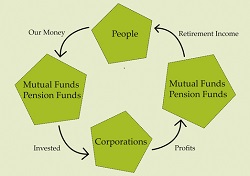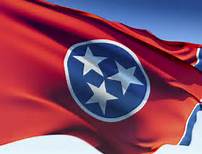|
People, Profits, & Pensions |
|
Credit Card Profits Help Fund Tennessee Retirees
Monday, February 3, 2014
That includes government employees and retired government employees in Tennessee. The Tennessee Department of Treasury, which represents the Tennessee Consolidated Retirement System (TCRS), owned almost $93 million worth of MasterCard shares as of September 30, 2013 (the number of shares is not being referenced because of a recent stock split), according to nasdaq.com. And, who are these 'new capitalists' within TCRS? Here's how one state document puts it, "The TCRS is a defined benefit plan with approximately 212,000 active employee members and 116,000 retirees comprised of four large groups of public employees. The aggregate retirement benefits paid annually by TCRS are approximately $2 Billion. The groups are K-12 public school teachers, state employees, higher education employees, and local government employees." If MasterCard does well, these public employees will see the value of their pension funds increase, and if MasterCard does poorly, the fortunes of their pension fund wane too. This credit card company is just one of many corporations in the Tennessee portfolio. Altogether, 55% of the fund's assets are invested in domestic (American) and international (other countries) stocks. So when MasterCard announced it's Fourth Quarter and Full Year 2013 results on Friday, the news mattered to Tennessee's public employees (and many others). Here's an excerpt from MasterCard on its Full Year 2013 results in a news release,
The Bigger Picture:Will Profits from Big Macs Add to Your Retirement Income?In 1948, the McDonald brothers redesigned and remodelled their drive-in restaurant in San Bernardino, California. Taking inspiration from Henry Ford's assembly-line, they created the fast food revolution, with the quick service and low prices we now take for granted. In that same year, the U.S. National Labor Relations Board ruled unions could include pension issues in contract negotiations. That ignited a massive expansion of pension plans. In the 1950s, pension funds started buying stocks, rather than just bonds or their equivalents; in addition mutual funds came of age. With these two developments working, middle class people became owners of big business. At first, their stakes were modest, but steadily growing. And in just a few decades, they gained controlling interests in many large corporations through their funds. Management guru Peter Drucker has called it, "...one of the most startling power shifts in economic history." Now, working people reap the benefits of those investments, collecting much of the profit distributed by McDonald's and other big corporations. Discover how the pieces fit together. In Big Macs & Our Pensions: Who Gets McDonald's Profits? - a new booklet -(about 25-pages), you will:
You may not be among the owners of McDonald's. But if you belong to any pension plan, or contribute to a mutual fund or whole life insurance policy, you likely own pieces of some big corporations. More importantly, though, your retirement income will be bigger and grow more dependably than you would otherwise expect. Big Macs & Our Pensions: Who Gets McDonald's Profits? is now available at Amazon.com
|

The Ownership Cycle
Copyright 2014. Robert F. Abbott, All Rights
Reserved.
|

 By: Robert F. Abbott, author of
By: Robert F. Abbott, author of  You'd think I'd refer to those devils on Wall Street if I talked about the people who get the
profits from credit cards. But, no, most of those profits actually end up supporting the retirement incomes of
middle class people around the world. Data at
You'd think I'd refer to those devils on Wall Street if I talked about the people who get the
profits from credit cards. But, no, most of those profits actually end up supporting the retirement incomes of
middle class people around the world. Data at